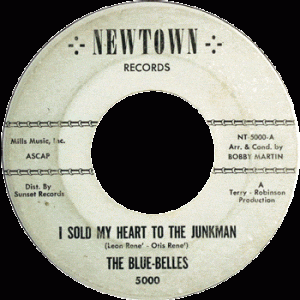
 I used to love this record when I was a kid growing up in Atlantic City. I don’t know what it was about it — the manic energy, the high-pitched caterwauling of Patti Labelle (or was it Patti? Read on), or the intense backing from the Blue Belles. Maybe it’s just a great song, but the performance seems almost otherworldly now.
I used to love this record when I was a kid growing up in Atlantic City. I don’t know what it was about it — the manic energy, the high-pitched caterwauling of Patti Labelle (or was it Patti? Read on), or the intense backing from the Blue Belles. Maybe it’s just a great song, but the performance seems almost otherworldly now.
Of course back then I had no idea how controversial the record was, not in terms of subject matter, but in terms of credits. It wasn’t until I started researching the record for this column that I ran into the morass of claims, counter-claims, and alternate spellings that surround this records.
Here’s what we know for sure; “I Sold My Heart To the Junkman” was written by JimmieThomas, and originally recorded by a group called the Starlets. But even that is not entirely accurate. While the Starlets recorded the first upbeat version, the song was made famous as a ballad in the ’40s by the Basin Street Boys, and later recorded by the Silhouettes in that style.
Here’s where it gets complicated. In 1962 the Starlets were a prominent Chicago vocal group, based on their hit record “Better Tell Him No.” This guy Harold Robinson convinced them to record “I Sold My Heart To the Junkman” on his Newtown Records label. When it was time to release the record however, Robinson, for reasons unknown but surely shady, credited it to a Philadelphia group called the Ordettes, who later became the Blue-Belles, and finally Patti LaBelle and the Blue Belles.
The song eventually reached #15 on the Billboard Pop Chart, due in large part to an appearance by the Blue Belles on American Bandstand in 1962. It is not know to this day whether Robinson erased the lead vocal recorded by the Starlets, or whether he substituted the original backing vocals with those of session musicians.
As you might imagine, the Starlets manager sued Robinson and got a settlement of $5,000 for each member of his group. The Starlets later recorded “I Sold My Heart To the Junkman” again, and oddly enough it sounded remarkably similar to the Blue Belles version. They never got over the whole thing though, and by 1963 the Starlets were no more. Meanwhile, Patti LaBelle and the Blue Belles went on to fame and fortune, eventually becoming, simply, LaBelle.
The music business has a million sordid stories. This is one of them.





Comments